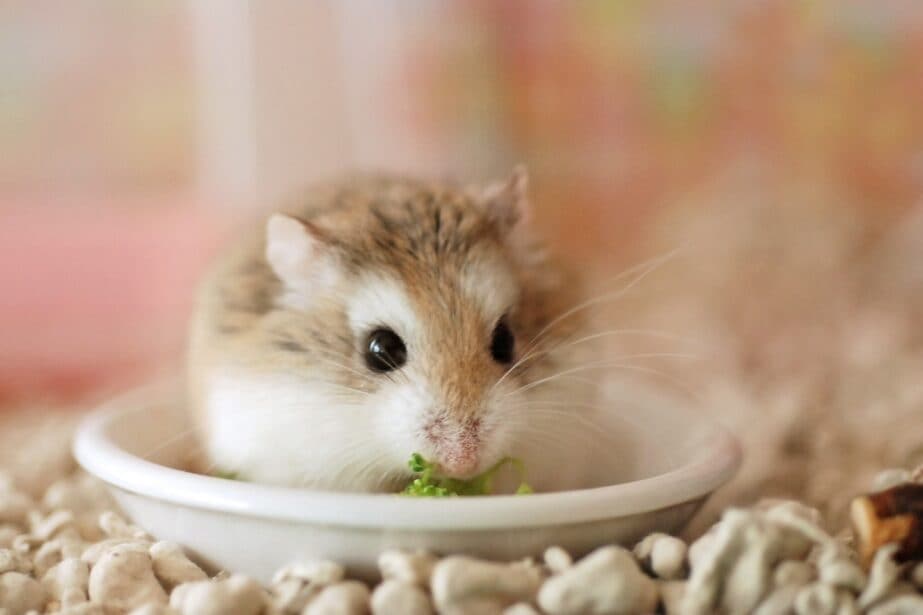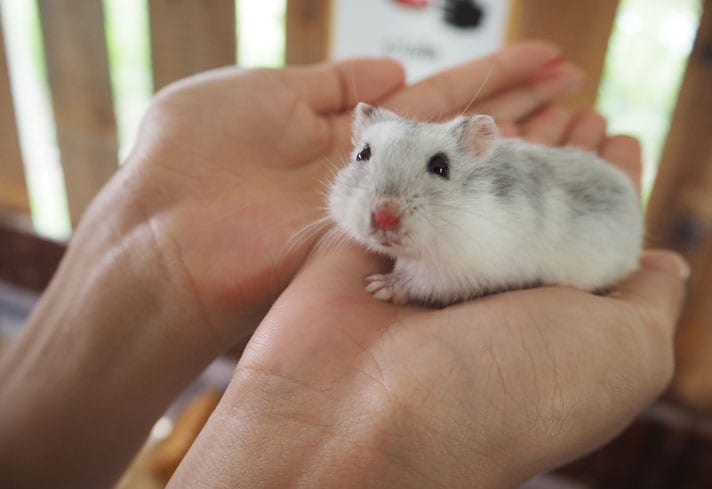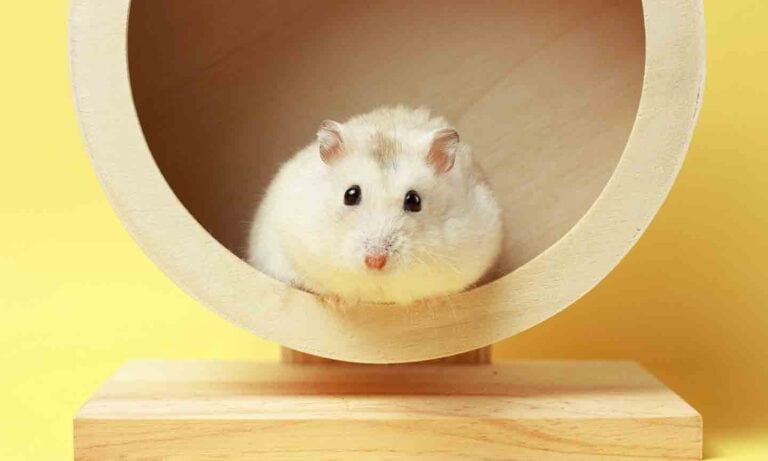Hamsters are small, easy to care for, and oh-so-cute, making them a great first pet or addition to your family—but how much do hamsters cost? And how much can I expect to spend over the course of their lives?
It’s important to factor in more than just the initial price tag of buying a hamster. From toys and food to a cage, these curious little pets come with a few ongoing expenses that might add up to more than you expect.
We chatted with veterinarians and the founder of an Ohio-based hamster rescue to break down how much hamsters can cost, plus tips for providing the best care for your hamster that is within your budget.
In This Guide:
Common Costs of Bringing Home a New Hamster
So, how much do hamsters cost when it comes down to it? Below is a table of estimated costs for bringing home a new hamster, though you may find that owning a hamster can cost less (or more) depending on where you shop or if you choose DIY or secondhand options.
|
Expense |
Estimated Cost |
|
Adoption fee |
$10–$30 |
|
Breeder fee |
$50–$75 |
|
Pet store fee |
$15–$25 |
|
Start-up pet supplies |
$102–$394 |
|
Veterinary costs |
$30+ |
Annual Costs of Keeping a Hamster
Hamsters have an expected lifespan of 1.5–3 years, depending on the species. Throughout their lifespan, you'll have monthly costs for food, bedding, and veterinary care.
"Luckily, most hamster supplies are a one-and-done item, so once you buy everything, you shouldn't need to buy much in the future—unless you want to change up the look of your cage," says Autumn Hamilton, the founder and coordinator of Ohio-based hamster rescue Happy Horizon Hamster Haven.
|
Expense |
Estimated Cost |
|
Food |
$60–$144 |
|
Bedding |
$120–$180 |
|
Vet care |
$360+ |
|
Estimated total |
$540+ |
Ongoing Maintenance Costs: $45+/month
Broken down into monthly cost, you will likely need to budget about $45 per month to keep your little buddy well fed, clean, and in their best health.
Increase your budget to include new toys or other enrichment items if you wish to update your hamster’s cage more frequently.
Buying or Adopting Hamsters: $10–75
Whether you adopt from a shelter or purchase your pet hamster from a pet store, fees can range from as low as $10 to around $75.
But no matter how you acquire your pet hamster, “always ask questions and dig a bit deeper,” says Joanne Fernandez, DVM, a small animal veterinarian and director of veterinary affairs at ABCs Puppy Zs. “You need to be aware of previous health conditions and a pet’s standard care before taking responsibility.”
Here’s a breakdown of the various ways to get a pet hamster and the pros and cons of each.
Adoption: $10–$30
While the history and/or age of hamsters may be unknown at shelters, there are plenty of benefits to adopting:
- Gives a home to a hamster in need
- Often comes with a health and behavior report
- Shelter staff are usually very knowledgeable about hamster care
- Older hamsters may be available, often with known personalities
- Adopted hamsters are typically more thoroughly health-checked
- Many shelters provide post-adoption support
- History and/or age may be unknown
Pro tip: Keep an eye out for adoption events and promotions where the adoption fees are waived or heavily discounted. Check websites such as Adopt-A-Pet for adoptable hamsters in your area.
Private Breeders: $50–$75
There are both pros and cons to purchasing a hamster from a private breeder:
- Learn about the hamster's genetic history
- Usually well-socialized
- Specific breeds and colors are available
- Higher prices
- There may be months-long waiting lists for certain breeds
Pet Store: $15–$25
Hamsters can be purchased from a pet store, which can offer:
- Wide availability and convenience
- You can often observe the hamster’s living conditions firsthand
- Staff may have limited expertise in hamster care
- Pet store hamsters typically come from commercial breeders
If you're particular about the type of hamster you want—their size and temperament can vary significantly—it's important to first get to know the five species of hamsters commonly kept as pets.
- Syrian hamsters (also known as teddy bear hamsters, the largest species)
- Chinese hamsters
- Winter white dwarf hamsters
- Campbell Russian dwarf hamsters
- Roborovski hamsters (also known as "robo" hamsters, the smallest species)
Syrian hamsters tend to cost the most, around $22–$25, whereas dwarf hamsters cost approximately $20–$22.
Essential Setup Expenses: $102–$394
Once you’ve welcomed your pet hamster home, it’s time to stock up on all the supplies necessary to give them the very best care.
Beyond basic housing and food, your pet will need plenty of toys to explore and play with. “Hamsters are very curious creatures,” says Hamilton.
Cage and Habitat: $30–$200
According to Hamilton, the best hamster cages have at least 650 square inches of floor space. You can choose a commercial cage, a 40- to 75-gallon cage, or, for a budget-friendly option, a large, plastic bin with added ventilation. Whatever you go with, keep the following tips in mind.
Key Features To Look For
- A deep base for plenty of bedding (hamsters are ground-dwellers that love to burrow)
- Solid, chew-resistant materials
What To Avoid
- Wire cages (risk of escape and injury)
- Multiple small, connected cages
- Cages with poor ventilation
Food and Water Supplies: $23–$65, Plus an Additional $5–$12/month
Because hamsters are omnivores, they can eat a variety of foods such as seeds, meats, veggies, fruits, and even insects.
Avian and exotic veterinarian Susan Tyson, VMD, MS, recommends a diet of:
- 70% commercial pellets
- 20% healthy veggies (basil, broccoli, carrots, cauliflower, red bell pepper, celery)
- 2% low-sugar fruits (cranberries, blackberries, kiwi, strawberries)
- Daily hay and dried grasses
Here’s a breakdown of all food-related costs for pet hamsters:
Hamster Food: $5–$12/month
Dr. Tyson recommends a commercial pellet diet. “Otherwise, hamsters tend to pick out the parts that they like and discard the rest,” she says.
Food Dish: $4–$10
Dr. Fernandez favors ceramic hamster dishes because they’re durable and chew-resistant.
Water Bowl or Bottle: $5–$15
Choose between a water dish or a bottle with a drip system.
Supplements: $8–$25
Provide vitamin supplements only if recommended by your veterinarian.
Toys and Enrichment: $20–$80
Don’t overlook the importance of hamster toys and other enrichment items.
“Hamsters are burrowing and foraging creatures, so they spend hours per night running and foraging,” Hamilton says.
Exercise Wheel: $15–$40
Dr. Fernandez recommends a running wheel that’s at least 8 inches in diameter for dwarf hamsters and 12 inches or larger for Syrians.
If your hamster's back bends while running, the wheel is too small, says Hamilton. Choosing a solid-bottom wheel prevents your hamster’s toes from getting caught and injured.
Hideout/Sleeping Area: Up to $25
Because hamsters are nocturnal, tunnels, huts, and hideouts give them a safe place to retreat to, sleep, and store food.
You can use commercial options or DIY items like toilet paper rolls and tissue boxes to create these cozy spaces.
Chew Toys: $5–$15
Rodents' teeth continuously grow. Providing chew toys helps to naturally wear down their teeth to prevent overgrowth.
Bedding and Substrate: $10–$15/month
Hamsters like to burrow, so bedding should be at least 6 inches deep.
As for substrate, or nesting material, no need to spend much, if any, money. “Many of our small mammals enjoy tearing up paper or cardboard for nesting material,” says Dr. Tyson.
Here are tips for choosing the best bedding for your pet.
Appropriate Bedding for Hamsters
Bedding To Avoid
- Pine or cedar shavings
- Scented beddings
- Cotton or fiber bedding
- Cat litter
Grooming Supplies: $14–$34
Hamsters shouldn’t be bathed in water. However, they may need other routine care, such as nail trimming, sand baths, and, depending on species, occasional brushing.
Sand and Container: $7–$20
“Hamsters absolutely love rolling in sand to clean themselves and control their natural oils—we call it a sand bath,” Hamilton says.
You can buy specialty sand, or for a budget-friendly option, use children’s play sand. If you choose play sand, Hamilton recommends baking it at 350 degrees F for about 45 minutes or until dry to sanitize it.
Nail Clippers: $7–$12
You can clip your hamster’s nails at home as long as your veterinarian has shown you how to do it safely. Or you can schedule a vet tech appointment to have them trimmed.
Brush: Up to $7
“Long-haired Syrian hamsters may need to be brushed with a little cat comb or toothbrush to help with matting in the fur,” Hamilton says.
Veterinary Care: $30+
Like any other pet, bring your hamster to a small mammal or exotic veterinarian, who can perform a wellness exam to rule out any illnesses. They can also answer any questions you may have about caring for your hamster.
Hamsters should have at least one wellness checkup a year, or more if recommended by your vet.
- Initial Check-Up and Annual Wellness Exams: $30–$100
- Emergency Care: $80+
Budgeting Tips for Hamster Parents
“Owning a hamster doesn't have to be expensive,” Hamilton says. Follow these tips to help keep costs down:
- Adopt during special events. Look for low-fee or fee-waived adoption events.
- Thrift for supplies. You can find ceramic, glass, and metal items secondhand and thoroughly clean them before use. Buy new cardboard, wood, or hay items since they can’t be properly sanitized.
- Use household items for enrichment. Toilet paper rolls and tissue boxes make great, cost-free toys.
- DIY a cage. A plastic storage bin with added ventilation makes for a budget-friendly hamster cage.
- Invest in a large cage. “The bigger the cage, the more you actually save on bedding,” says Hamilton. With a larger cage, you’ll only need to spot-clean soiled areas instead of frequently cleaning the entire cage.
FAQs
Q:How much do hamsters usually cost?
A:
Hamsters typically cost $15–$25 at a pet store, or they can be adopted from a rescue or shelter for $10–$30. Keep an eye out for adoption events, where fees may be waived or heavily discounted.
If you're looking for a specific breed or color, you might choose to buy from a reputable breeder, with hamster prices ranging from $50–$75.
Q:Do I need one or two hamsters?
A:
Most hamsters prefer to live alone, as they may fight if they are housed together. If you plan to keep two opposite-sex hamsters, Tyson recommends spaying and/or neutering them, as they’re prolific l breeders.
This advice differs from recommendations for gerbils and guinea pigs, she notes, which can happily live in same-sex colonies when spayed or neutered.
Q:Are hamsters cheap to keep?
A:Hamsters are generally an affordable pet, but it's important to consider more than just their initial cost. The estimated annual cost of keeping a hamster, including veterinary care, food, and bedding, is around $540, after their initial adoption or purchase fees and start-up supplies.
Q:How long does one hamster live?
A:Hamsters have an expected lifespan of 1.5–3 years.
Like this story? Check out more of our favorite reads:
Share:















